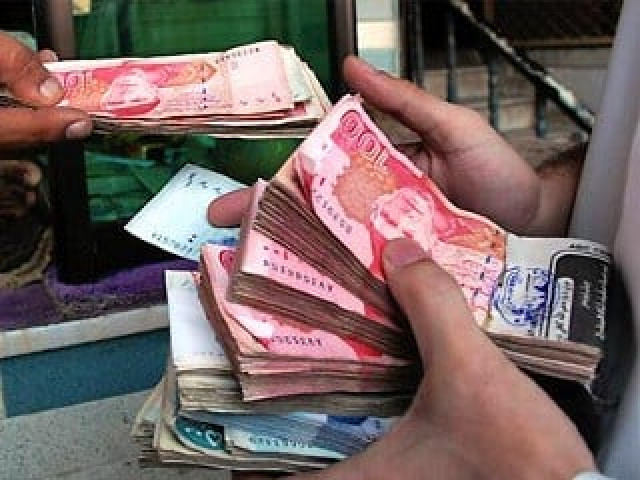Foreign debt rising: Govt’s loans tally up to $5.1 billion
It borrowed $8.5 billion from domestic financial institutions; only $0.5b received as grants

PHOTO: PAKKHUDAFIS
Pakistan received $5.6 billion in foreign financing in fiscal year 2015, over 90% of which was in the form of loans. The government fell short of its estimates by $1.8 billion, mainly due to its inability to introduce reforms in the energy sector, and made up for the shortfall with heavy domestic borrowing.
The government had projected receiving $7.4 billion in loans and grants in the fiscal year that ended June 30. Instead, it was able to secure only $5.1 billion in loans and $515 million in grants, according to figures released by the Economic Affairs Division of the finance ministry.
Among the grants, the United Kingdom was the single largest donor, giving $260 million, followed by the United States, which gave $97.4 million, and China, which provided $47.7 million.
Of the $5.1 billion in new foreign debt, $1 billion was raised by floating a US-dollar denominated sukuk (Islamic bond) on the global capital markets. The government also secured a $100 million short-term loan from the London-based Standard Chartered Bank after loans from multilateral lenders fell through.
As much as 18% of the total economic assistance was short-term credit that the government has to either roll over or retire in fiscal 2016. Roughly one-fourth of the foreign inflows came in shape of budgetary support while project assistance was slightly over one-third. Only 2% of the receipts were meant for 2014 flood relief activities.
Part of the reason behind the shortfall was lethargy on the part of Pakistani bureaucrats in approving the development projects that needed foreign financing, as well as delays in procurement, according to officials familiar with the budgetary process. As a result of the bureaucratic laziness, many foreign funded projects will now face delays. Pakistan received Rs92 billion in foreign financing for development projects in fiscal 2015, against a budgeted Rs102 billion.
According to the EAD, the Asian Development Bank gave $450 million in loans in fiscal 2015, 59% less than the government’s estimates of $1.1 billion. The ADB delayed the approval of $400 million in budgetary support for the energy sector due to the government’s failure to implement reforms.
The World Bank gave $1.2 billion, or slightly less than two-thirds of annual estimates of $1.9 billion. The World Bank too has postponed the approval of a $500 million loan for energy sector reforms. The Washington-based lender was the single largest source of development assistance last year, followed by Islamic Development Bank and China.
After failing to implement the reforms that would have resulted in financial assistance from the ADB and the World Bank, the government turned to domestic borrowing to make up for the shortfall, borrowing Rs865 billion ($8.5 billion) from local financial institutions in fiscal 2015, compared to Rs303 billion in fiscal 2014, according to the State Bank of Pakistan. The government’s heavy borrowing has meant that banks have very little left to lend to the private sector.
China lent slightly over $1 billion, which was 30% less than the government’s estimate of $1.5 billion. Beijing lent mainly for the construction of two nuclear power plants in Karachi.
The Islamic Development Bank was the only multilateral institution that gave more than the government’s estimates. The country received $1.15 billion from the IDB, which was 15% more than the government’s projections.
The UK was the only country that gave more than what it promised. It extended $260 million in grants to Pakistan in fiscal 2015, $14 million more than promised. In contrast to London’s generosity, the US gave only $97.4 million, 73% less than its promised $358 million, according to the EAD.
Published in The Express Tribune, July 25th, 2015.



















COMMENTS
Comments are moderated and generally will be posted if they are on-topic and not abusive.
For more information, please see our Comments FAQ